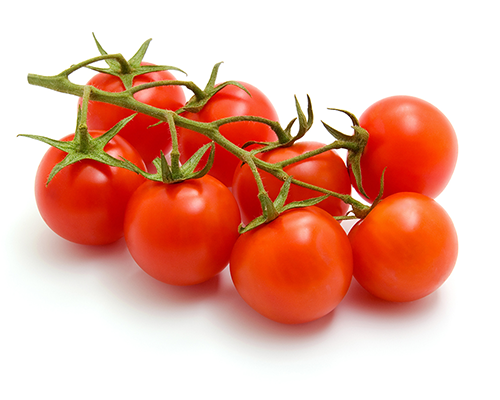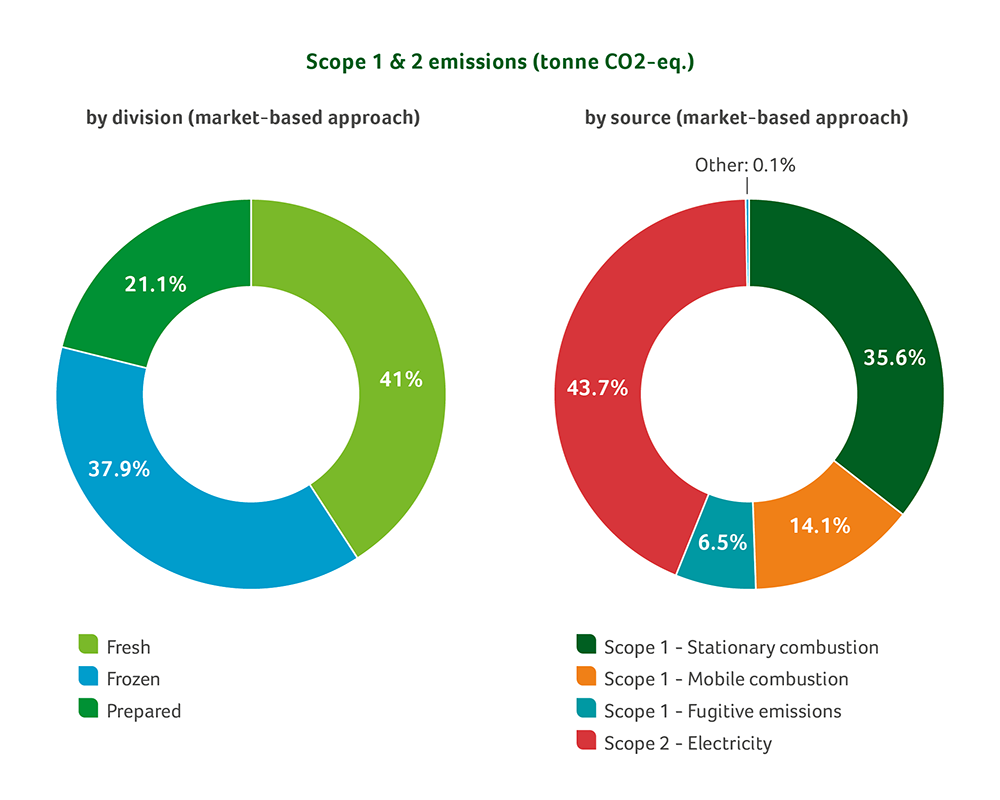

Our approach
We report our corporate carbon footprint annually by calculating our total Scope 1, Scope 2 and Scope 3 greenhouse gas emissions. We started to measure the most material KPIs of our Scope 1 and 2 emissions on a monthly basis as of this year. This allows us to steer and follow-up our actual performance more closely.
Our footprint in terms of Scope 1 and 2 emissions covers our own operations (consisting of factories operated by Greenyard, but excluding co-packers), our own warehousing (consisting of distribution centres operated by Greenyard, excluding third-party warehousing) and our own logistics (consisting of fleets operated by Greenyard and including our company cars). Scope 3 emissions cover the fruit and vegetables we are sourcing, third party logistics, packaging, waste, and business flights. The data is calculated, verified and reported in line with the GHG-Protocol.
The Group discloses its climate-related risks and impact under the terms of the CDP (2021 score B-), ensuring consistency in the information provided to stakeholders in line with the recommendations of the Task Force on Climate-related Financial Disclosures (TCFD).
Greenyard falls under the scope of EU Taxonomy Regulation (EU 2020/852). As such and as per Taxonomy Disclosure Delegated Act of (EU 2021/2178) it should disclose the share of eligibility and non-eligibility of its activities for the first two annexes of Climate Delegated Act (EU 2021/2139; Annex I on climate change mitigation and Annex II on climate change adaptation) in AY21/22. We undertook a screening exercise with a specialised consultancy partner. Greenyard’s key revenue-generating activities consist of the wholesale and distribution of fresh fruit and vegetables and the production of frozen and prepared fruit and vegetables, which are not covered in either of the annexes of the Climate Delegated Act. As such, the exercise concluded that the share of eligible turnover was not material (<1%). Further calculations in terms of CAPEX and OPEX were not deemed relevant at this stage.

Our progress
Greenyard has committed to reduce its Scope 1 and 2 greenhouse gas emissions by 50% by the end of 2025 from a 2020 baseline. This year, our Scope 1 and 2 emissions decreased by 6,5% on a like-for-like basis. The progress is in line with expectations and is driven by the switch to renewable and low-carbon energy sources and continued investments in energy-efficiency. The divestment of Greenyard Prepared Netherlands caused a significant reduction in energy use and greenhouse gas emissions. This is excluded from the above-mentioned trend.
Greenyard joined the Science Based Targets initiative (SBTi) and submitted corporate greenhouse gas emission reduction targets for its Scope 1, 2 and 3 emissions in line with limiting the global temperature rise to 1.5°C. These targets were validated by SBTi in April 2022 (certificate GREN-BEL-001-OFF). Greenyard commits to reduce its Scope 1 and 2 greenhouse gas emissions with 70% by the end of 2030 compared to 2020. The Group recognises its responsibility to also support the reduction of greenhouse gas emissions beyond its direct influence. Greenyard therefore also commits that 70% of its suppliers (by spend covering purchased goods and services, upstream and downstream transportation and distribution) will have science-based targets by the end of 2026. At present 10% of our suppliers have set science-based targets.
Greenyard decided to move towards a full electric car policy in its core markets where electric loading facilities are available (Netherlands, Belgium, UK, France, Austria and Germany). Every new lease car we order will be an electric car and at all core locations loading facilities will be installed. This way our complete lease fleet will become fully electric in the coming years. We have also introduced an internal carbon price of 100 euro per tonne CO2 which can be included in business cases and which will help to promote more sustainable alternatives.
In line with TCFD recommendations, Greenyard conducted a quantitative scenario-analysis trial on one of its supply chains. The grape supply chain was identified as a case study given the worldwide sourcing footprint and production regions typically situated in dry areas with good water availability. Changing temperatures and precipitation patterns could influence productivity both in the short term and in the long run. Twenty production locations were analysed against the rcp45 and rcp85 scenarios both for 2030 and 2050. The conclusions bring extra substance to the insights of our own experts and will assist the sourcing teams for the medium and the long term. Further case studies are being contemplated for fruit and vegetables destined for processing.
Future plans
Our long-term ambitions are clear, and we have plans in place to realise these ambitions within our Sustainability Roadmap, which was published last year. In the coming financial year, we will also start to translate the long-term plans into an annual planning per division, on entity level. Further transitions to renewable and low-carbon energy have been contracted whereby we actively seek projects to realise renewable energy production on-site. Elsewhere efforts in alternative fuels and studies in alternative steam generation will assist in reaching the reduction target of 70% by 2030. This year, 11% of our electricity consumption came from renewable sources.
An important milestone for the new financial year will be to run a supplier survey among our top-400 suppliers to learn where they stand on climate action and stimulate them to adopt science-based targets. We will organise workshops on the top-10 product groups with our internal strategic sourcing teams to develop further action plans in terms of reducing our Scope 3 emissions. To this end, we also seek to further improve the reporting of our Scope 3 emissions. Greenyard is taking a leading role with its trade associations to develop environmental footprint category rules for the fruit and vegetable sector.